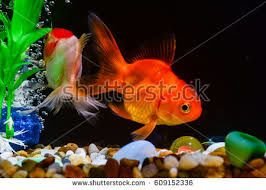Humans and most other vertebrate animals die within a few minutes without oxygen. Yet goldfish and their wild relatives, crucian carp, can survive for days, even months, in oxygen-free water at the bottom of ice-covered ponds.

During this time, the fish are able to convert anaerobically produced lactic acid into ethanol, which then diffuses across their gills into the surrounding water and avoids a dangerous build-up of lactic acid in the body.
The molecular mechanism behind this highly unusual ability, which is unique among vertebrates and more commonly associated with brewer's yeast, has now been uncovered and is published in the journal Scientific Reports.

The international team has shown that muscles of goldfish and crucian carp contain not just the usual one, but two sets of the proteins normally used to channel carbohydrates towards their breakdown within a cell's mitochondria -- a key step for energy production.
While one set of these proteins appears very similar to that in other species, the second set is strongly activated by the absence of oxygen and shows a mutation that allows channelling of metabolic substrates to ethanol formation outside the mitochondria.
Further genetic analyses suggest that the two sets of proteins arose as part of a whole genome duplication event in a common ancestor of goldfish and crucian carp some 8 million years ago.
Dr Michael Berenbrink, an evolutionary physiologist at the University of Liverpool, said: "During their time in oxygen-free water in ice-covered ponds, which can last for several months in their northern European habitat, blood alcohol concentrations in crucian carp can reach more than 50 mg per 100 millilitres, which is above the drink drive limit in these countries.
"However, this is still a much better situation than filling up with lactic acid, which is the metabolic end product for other vertebrates, including humans, when devoid of oxygen."
Lead author Dr Cathrine Elisabeth Fagernes, from the University of Oslo, said: "This research emphasises the role of whole genome duplications in the evolution of biological novelty and the adaptation of species to previously inhospitable environments.
"The ethanol production allows the crucian carp to be the only fish species surviving and exploiting these harsh environments, thereby avoiding competition and escaping predation by other fish species with which they normally interact in better oxygenated waters.

"It's no wonder then that the crucian carp's cousin the goldfish is arguably one of the most resilient pets under human care."
The work is the result of a collaboration between scientists at the University of Liverpool, UK, and the University of Oslo, Norway. The work was funded by the Research Council of Norwa
Source: https://www.sciencedaily.com/releases/2017/08/170811085036.htm
Not indicating that the content you copy/paste is not your original work could be seen as plagiarism.
Some tips to share content and add value:
Repeated plagiarized posts are considered spam. Spam is discouraged by the community, and may result in action from the cheetah bot.
Creative Commons: If you are posting content under a Creative Commons license, please attribute and link according to the specific license. If you are posting content under CC0 or Public Domain please consider noting that at the end of your post.
If you are actually the original author, please do reply to let us know!
Thank You!
Congratulations! This post has been upvoted from the communal account, @minnowsupport, by ammadula from the Minnow Support Project. It's a witness project run by aggroed, ausbitbank, teamsteem, theprophet0, someguy123, neoxian, followbtcnews, and netuoso. The goal is to help Steemit grow by supporting Minnows. Please find us at the Peace, Abundance, and Liberty Network (PALnet) Discord Channel. It's a completely public and open space to all members of the Steemit community who voluntarily choose to be there.
If you would like to delegate to the Minnow Support Project you can do so by clicking on the following links: 50SP, 100SP, 250SP, 500SP, 1000SP, 5000SP.
Be sure to leave at least 50SP undelegated on your account.
Hi! I am a robot. I just upvoted you! I found similar content that readers might be interested in:
https://www.sciencedaily.com/releases/2017/08/170811085036.htm
wow,,, wonderfull,,fish
Thanks